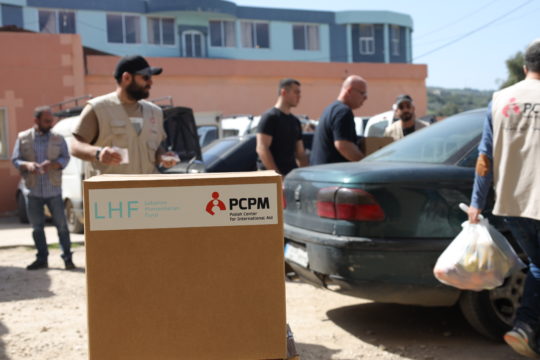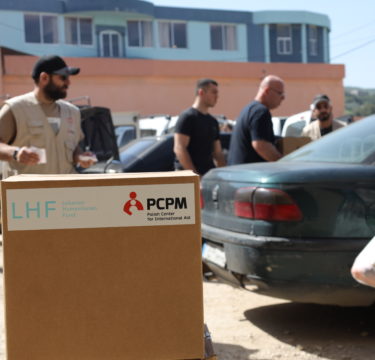Crisis in Lebanon. PCPM helps more than 550 families


Many families are without electricity and the value of the Lebanese pound has fallen dramatically. Without renting a private power generator, families can only rely on one hour of power per day. These and many other problems are faced by Lebanese families. PCPM helps the most vulnerable among them.
Lebanon was called the Switzerland of the Middle East back in the 20th century but has been a mere shadow of its earlier glory for decades. But before that, underneath the cover of a colorful life of affluence, Lebanon was consumed by an inefficient political system and a sectarian split. This became fully apparent between 1975 and 1989 when civil war raged through the country. Lebanon never returned to its pre-conflict state, slowly slipping into the abyss.
After numerous political crises, Lebanon was hit hard by the outbreak of civil war in Syria. The country with its capital in Damascus was its most important economic partner, with an additional 1.5 million Syrian refugees flowing into Lebanon. Many humanitarian organizations, including the Polish Centre for International Aid, helped the refugees, but this was a drop in the ocean of needs. All these events were sinking the country, but the real catastrophe was yet to come.
Chain reaction
The crisis, both humanitarian and economic, in Lebanon continues to deepen. Already in 2019, it seemed that things could not get any worse, but then came the COVID-19 pandemic, the Beirut port explosion, and the escalation of the conflict in Ukraine.
The Lebanese pound has lost 90 percent of its value, but according to experts this is still an overestimate, and in reality, the currency is even weaker. Inflation is estimated to be in triple digits, public services have collapsed; without hiring a private power generator, households can only rely on an hour of power per day.
Unfortunately, the conflict between Israel and Hamas in the Gaza Strip is also negatively affecting Lebanon. At least 99 civilians have been killed as a result of mutual shelling and, according to the UNHCR, more than 90,000 civilians have had to leave their homes, in southern Lebanon.
The dangerous situation between Israel and Lebanon negatively impacts the already limited tourist traffic, and this makes the material situation of the Lebanese even worse.
“Not even enough for food”.
Many Lebanese, cannot even afford to buy enough food, not to mention other things like hygiene products or medicines. This is why the Polish Centre for International Aid, in cooperation with the Lebanon Humanitarian Found, helps the most vulnerable families.
When the PCPM started its mission in Lebanon, the aid was directed toward refugees from Syria. Now, support is needed for both Syrians and Lebanese.
– The illness I suffered was unexpected. I have been undergoing dialysis for 6 years, three times a week. After each treatment, I am very tired. My salary is barely enough for food. The prices of beans, rice, tomatoes, meat, tahini, or lentils are very high. That is why we are very grateful for the help of the Polish Centre for International Aid,” says Haitham from Dreib.
– We would like to thank the PCPM for helping us with food aid as we are having great financial difficulties. My husband worked in the local administration, but he no longer works there for three months. He is hard of hearing and has other various health problems. Our situation is critical. The meals I cook for my children include bulgur porridge, tomatoes, hummus, and other meals prepared from ingredients I have received. We will be getting this food continuously for six months. Since we get food aid, we can save some money that we would have spent on food. Now we can buy medicine or diapers for the children,” says Mona from Wadi Khaled about her situation.
The PCPM food program is designed to help families so that they can use the money they save for other things they need. However, in the Foundation’s assistance package, there are not only food supplies but also support for rent or the purchase of hygiene items.
– PCPM has helped me to rent a flat and provides me with food and hygiene packages. I love my job as a nurse. Not only for professional reasons but also for humanitarian reasons. I can help both myself and others. With the help of PCPM, I can save money that will be enough for my university fees. I have a lot of experience as a nurse, but I still need a year to get my degree. Now I can complete my studies, start working, be independent, and meet my son’s needs. Education is a woman’s weapon,” says Omar from Wadi Khaled.
The Polish Centre for International Aid has been implementing aid projects in Lebanon continuously since 2012. Right on the border with Syria, it runs the largest humanitarian aid program implemented by a Polish NGO. As the only Polish organization registered in Lebanon, it has been helping victims of the war in Syria since the beginning of the crisis, as well as Lebanese families affected by the effects of the biggest economic crisis in decades.